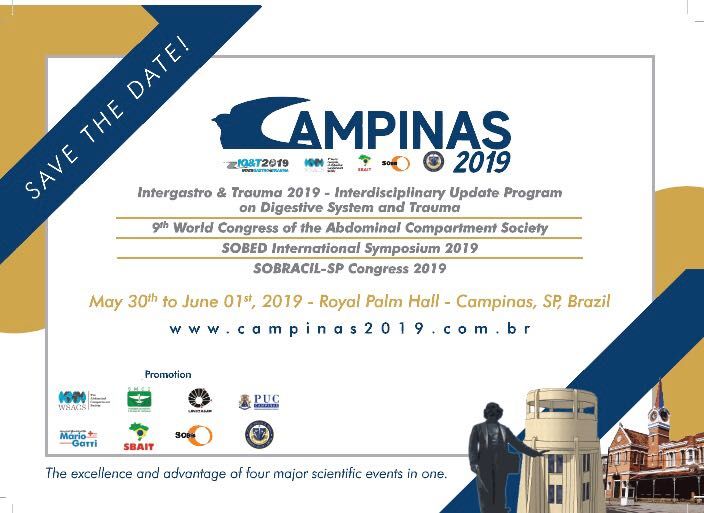WCACS 2019 – Campinas
Campinas, Brazil

During these last two years in the leadership of this Society we focused on education. There were several lectures, teaching strategies and research distributed throughout the planet, but mainly in Latin America, where in all likelihood the enlightenment on the subject seemed to be more distant. We believe to have done a good job, yet much is about to come. There is a need to alert and educate the population of physicians, surgeons, intensivists and other healthcare professionals who still omit or neglect the prevalence of intra-abdominal hypertension in critically ill patients for some reason or another. It is true that abdominal compartment syndrome hardly leads a patient to death alone. The clinical observations are subtle, insidious, and beyond. The presence of long-term intra-abdominal hypertension sustained in patients who already have perfusion disorder undoubtedly stimulates the patients to remain in the ICU for a longer period. Whether for prolonged period of mechanical ventilation resulting from an increase in intra-thoracic pressure caused by intra-abdominal hypertension, or from the difficulty of awakening the patient, a consequence of the decrease in cardiac output induced by the decrease in venous return caused by intra-abdominal hypertension and subsequently by the decrease in cerebral perfusion pressure or by the consistent and continuous flood of catecholamines and oxidative metabolism products such as IL1B, IL6, TNF, oxygen free radicals caused by the hypoperfusion state silently induced by intra-abdominal hypertension. This insidious process needs and must be noticed by the surgeon, intensivist and emergency physician and promptly reversed in order to mitigate the endocrine-metabolic response and microcirculatory damage.
The presentation of clear evidence in this and other contexts and themes will be discussed with partner societies at this World Congress in Campinas.
Traditionally, every current president leaves the Society in his acting city and this year could not be different. With my departure after two years on the president’s chair, I believe we are finalizing this long-awaited process with the golden key. Therefore, it is with great pleasure that we present you with the traditional Intergastro and Trauma, a majestic and original event unlike anything you have seen in the Brazilian national territory and also in a global scope.
After many hours of work and searching for the newest in the area, we come to a modern and multidisciplinary program capable of bringing to the rooms of the Royal Palm Hall those information really useful in their day to day life.
We will begin with pre-congress activities where point-of-care ultrasonography courses will be our primary focus. Three courses will be offered: the USPOC course with WSACS protocol and the USPOC course for surgeons and the Emergency Abdominal Surgery Course.
For the actual Congress days, we divide our international segment in 3 days.
On the first day we evolved important themes about fluid management in critical patients from their entry into the emergency room to admission at the ICU. This inaugural section is supported by the International Fluid Academy and requires a presence of emergency physicians – a new specialty in our country, surgeons, anesthesiologists and intensivists. Important topics and vowels that were being discussed on all continents of the Globe will be discussed at this event and for the first time in this multidisciplinary model.
On the second day, the focus is on complex abdomen. Much still needs to be discussed about the behavior of the patient with open abdomen with or without the presence of fistulas, such as synthesizing the abdomen quickly and safely, which is a better set of measures to be used in the ICU when faced with complex cases such as this. Experts from all over the world will be present and presenting new techniques and treatments for cases of this complexity that still consume high mortality rates.
Already on the third and last day, we will focus our attention on damage control resuscitation. This will be the First World Symposium on Damage Control Resuscitation (DCR) where we will explore the subject from the pre-hospital environment to the final treatment in different in-hospital instances. The theme of resuscitation in damage control has been responsible for an incredible diversity of studies and evidences in recent years, but there has never been a multidisciplinary meeting in order to discuss the issue as it does in daily practice. This symposium in addition to having specialists in the area will have the participation of specialists of the American and English armed forces with experience of war. On this day we will count on the support of THOR (Trauma Hemostasis and Oxygenation Research network) and EVTM (Endovascular Resuscitation and Trauma Management).
With this strong and current program, we hope to be able to welcome you in the city of Campinas, with the certainty that we will be giving you a different and striking event for your career.
Donate for WSACS research
Join WSACS – free lifetime membership
-
Discounts on World Congress registration fees
-
Access FOAM content via WSACS app
-
Clinical Trials Working Group (CTWG) membership
-
Support for research proposals and funding
-
Late-breaking IAH/ACS news